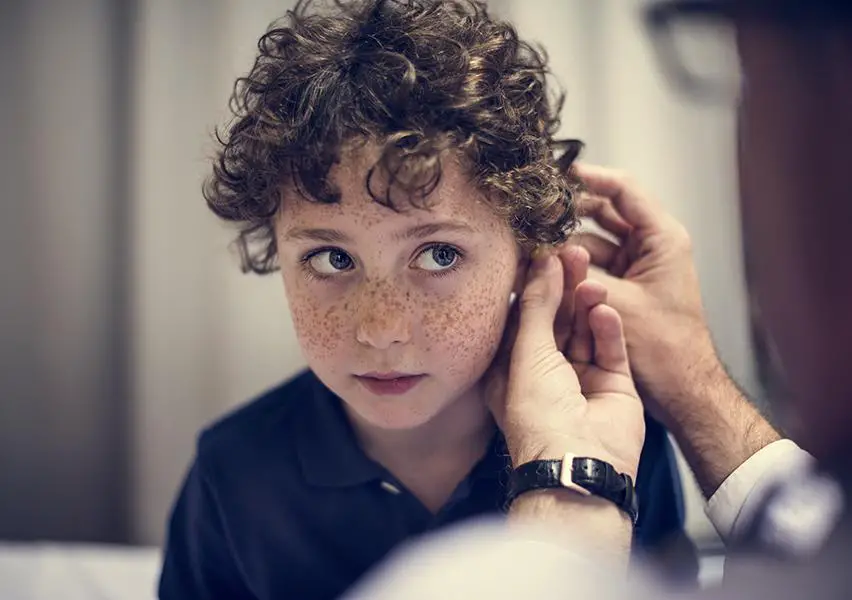Introduction
The fight against meningitis does not end with the successful treatment of the disease. For many survivors, the post-recovery journey involves grappling with long-term effects such as hearing loss. As caregivers, our role extends beyond ensuring physical wellness. We are champions of resilience, guides in navigating challenges, and supporters in the journey towards regained independence. This post delves into the multifaceted aspects of support and rehabilitation for individuals grappling with meningitis-related hearing loss.
The impact of hearing loss on the psychological well-being of survivors, the importance of strong support networks, and the availability of educational resources to bolster their independence will be explored. Furthermore, we’ll consider how workplace accommodations can help maintain professional growth and how self-advocacy strategies empower survivors. Each aspect signifies a beacon of hope and strength in
Psychological Impact of Meningitis-Related Hearing Loss and Coping Strategies
Meningitis-related hearing loss can be a significant psychological shock, accompanied by feelings of isolation, depression, and anxiety. The sudden change in sensory perception may lead to grief over the lost sense and fear about the future. However, understanding and managing these feelings can set the stage for successful coping and adaptation.
Support Networks and Organizations for Meningitis Survivors with Hearing Loss
When dealing with hearing loss after meningitis, no one needs to feel alone. Numerous organizations provide resources and support for meningitis survivors and their families. The Meningitis Research Foundation (link) and The Meningitis Now (link) are organizations that offer advice, connection, and a sense of community to those touched by the disease.
Educational Resources for Individuals with Meningitis-Induced Hearing Loss
Education plays a pivotal role in helping individuals with meningitis-induced hearing loss adapt to their new circumstances. With the right resources, these individuals can learn to communicate effectively, use assistive devices, and integrate into society with confidence. For instance, The National Deaf Children’s Society (link) provides resources for parents, teachers, and individuals with hearing loss, offering information about educational rights, accommodations, and technology.
Educational support extends to adults too. Universities, community colleges, and adult education programs often have services for students with hearing loss. For example, the Gallaudet University in Washington, D.C., is renowned for its programs for deaf and hard-of-hearing students (link). Online platforms like Coursera and edX also offer courses with captions, transcripts, and other accessibility features.
Access to the right information is crucial for self-advocacy. The Hearing Loss Association of America’s website (link) includes extensive resources on the laws protecting individuals with hearing loss, tips for communication, and links to technology that can help. Furthermore, the American Speech-Language-Hearing Association’s website (link) provides a wealth of information on understanding and managing hearing loss, including a state-by-state directory of services.
Workplace Accommodations for Professionals with Meningitis-Related Hearing Loss
Professionals with hearing loss can continue to excel in their careers with the right accommodations. According to the Job Accommodation Network (link), potential workplace accommodations for employees with hearing loss can include providing assistive listening devices, captioned phones, visual and tactile alert systems, and written communication when possible.
Many workplaces have also adopted inclusive strategies like video relay services (VRS) for conference calls, as well as captioning for all video content. Inclusive hiring practices are also becoming more common, with some companies, like Amazon, creating programs specifically designed to hire, train, and promote individuals with disabilities (link).
The workplace can sometimes be a challenging environment for those with hearing loss. However, under the Americans with Disabilities Act (ADA), employers are required to provide reasonable accommodations to enable individuals with disabilities to enjoy equal employment opportunities (link).
“Creating an inclusive work environment that caters to people with disabilities not only serves to comply with laws but it’s also a matter of fostering diversity and respect,” states the CEO of Microsoft, Satya Nadella, who has made considerable strides towards inclusion in the workplace (link).
Moreover, offering flexibility, such as the option of remote work, can significantly help employees with hearing loss. In many cases, a quiet, controlled environment can help them communicate more effectively.
What to Look for in Inexpensive Hearing Aids
Empowering Meningitis Patients: Strategies for Self-Advocacy and Independence
Encouraging self-advocacy in meningitis survivors with hearing loss is about promoting independence, personal growth, and resilience. Self-advocacy involves knowing and understanding one’s rights, communicating needs effectively, and making informed decisions about one’s health, education, and workplace rights.
The National Association of the Deaf (link) offers resources and tools for self-advocacy, including information on legal rights, education, employment, and health care. The ability to self-advocate can be empowering, enhancing self-confidence and independence.
Promoting self-advocacy in individuals with hearing loss involves nurturing their ability to stand up for their rights and make decisions about their healthcare and lifestyle. According to a report from the World Federation of the Deaf, “Promoting the human rights of deaf people is about ensuring they have the freedom to live as equals – including the ability to communicate, understand, and be understood” (link).
Janet DesGeorges, Executive Director of Hands & Voices, a nonprofit supporting families with children who are Deaf or Hard of Hearing, shares that “Empowering individuals who are deaf or hard of hearing means recognizing them as the primary decision-makers in their lives. Our job as supporters is to equip them with the tools and resources to make informed decisions” (link).
Indeed, self-advocacy is not about doing things alone – it’s about having the control and agency to make choices, with the support of caregivers, professionals, and the community. Teaching self-advocacy can unlock a greater sense of autonomy and confidence in individuals with meningitis-related hearing loss, contributing to their overall wellbeing and quality of life.
Conclusion:
As caregivers, our support can empower survivors of meningitis who are dealing with hearing loss. By understanding the psychological impact and arming ourselves with the right coping strategies, we can guide them through their journey. The role of educational resources, supportive networks, and organizations is paramount in this process, helping survivors to navigate their path with confidence.
Workplace accommodations can ensure survivors continue to thrive professionally, providing a sense of normalcy and purpose. Meanwhile, teaching self-advocacy equips survivors with the tools they need to maintain control over their lives, fostering a sense of empowerment and independence.
Supporting someone through meningitis and subsequent hearing loss is undoubtedly challenging, but with understanding, empathy, and the right resources, we can make a significant difference in their lives. In doing so, we not only assist them in their journey but also inspire their resilience, creating a ripple effect of positivity and strength.

Embracing Life with Sensorineural Hearing Loss: A Comprehensive Guide for Parents
Empower yourself with strategies to support your child’s journey with sensorineural hearing loss. Understand how to adapt your home environment, encourage self-care, provide travel support, manage emotional impact, and advocate for rights at the workplace.

Unveiling Otosclerosis: Understanding Its Impact and Navigating Life
Introduction Imagine the orchestra of life gradually tuning down until the world around you becomes a muffled echo. For many seniors grappling with Otosclerosis, this






